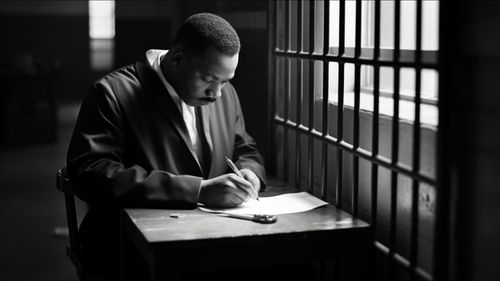MLK's Letter from Birmingham Jail: Concise Summary and Analysis
Feb 01, 2024 · 2 mins read
0
Share

"Letter from a Birmingham Jail" is Martin Luther Kings Jr's profound response to clergymen criticizing his fight against segregation. Written in 1963, it's a cornerstone of civil rights literature, arguing for justice over order.
Save
Share
King was in Birmingham because "injustice is here." He asserts that fighting injustice anywhere defends justice everywhere, making his presence in Birmingham not as an outsider, but as a moral duty.
Save
Share
He defends direct action and peaceful protest as necessary to force negotiation where it has been denied, drawing parallels with Biblical figures and historical movements that disrupted the status quo for righteous causes.
Save
Share
King expresses disappointment in white moderates, more devoted to "order" than to justice, who fail to recognize the urgency of the civil rights struggle and the necessity of nonviolent protest.
Save
Share
He critiques the white church for its silence or opposition, challenging religious leaders to align their actions with their teachings on brotherhood and justice, rather than being a "weak" force in the face of segregation.
Save
Share
King's letter is a masterclass in persuasive writing, rich with allusions to secular and religious texts, showcasing his rhetorical prowess and deep understanding of social justice.
Save
Share
Written on scraps of paper in his jail cell, the letter's composition reflects the urgency and resourcefulness of King's commitment to civil rights, even under confinement.
Save
Share
The letter's historical context is critical: Birmingham was a segregation stronghold, and King's campaign there was a strategic effort to confront one of America's most divided cities.
Save
Share
King's letter transcends its immediate context, offering timeless insights into the nature of justice, the ethics of civil disobedience, and the struggle for equality that continues to resonate today.
Save
Share
"Letter from a Birmingham Jail" is not just a defense of a movement; it's a blueprint for social change, a moral argument for action against injustice, and a call to live up to America's foundational promises.
Save
Share
0